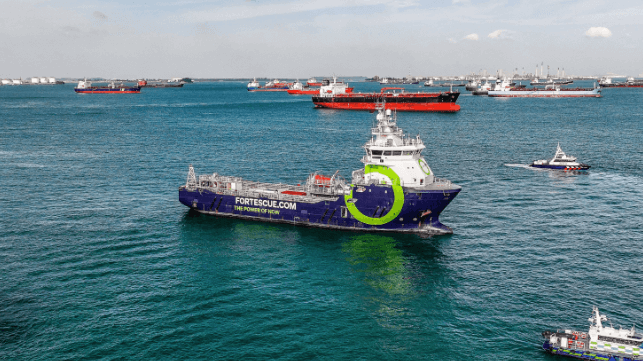Pro-Hydrogen Shipowners Use COP29 to Call for “Real Zero” Carbon Standard

This year’s COP29, the global climate conference focused on implementing the Paris Agreement, saw fewer big political names attending. Major leaders like Xi Jinping, Joe Biden, Narendra Modi, Olaf Scholz, Lula da Silva, and Emanuel Macron chose not to participate. With the U.S. set to have a new president, Donald Trump, the country is expected to pull out of the Paris Agreement soon.
However, while some political leaders were absent, important figures from the shipping world showed up in large numbers. Among them was Arsenio Dominguez, the Secretary-General of the International Maritime Organization (IMO), along with other key shipping industry players.
Shipping Takes the Lead at COP29
At the conference, over 50 major companies and organizations in the shipping sector joined forces to make a strong call for action. They want the shipping industry to focus on hydrogen-based alternative fuels. This effort was led by Fortescue, a large mining company from Australia that has big plans for green hydrogen. The petition was signed by well-known names like Anglo-Eastern, Adani, LR, ONE, MOL, Trafigura, and Fortescue. Surprisingly, Maersk, which once pushed hard for hydrogen-based fuels, chose not to sign this petition.
A Push for New Fuel Standards
The petition has several key demands. One of the main goals is to adopt strict rules on greenhouse gas emissions by next April at the MEPC83 meeting. These rules are expected to take effect by 2027. The shipping leaders want a fuel standard that requires low greenhouse gas emissions, with a strong penalty for those who don’t follow the rules. They also suggest a global tax on emissions, around $100 to $150 per ton of CO2 equivalent. This is similar to $300 to $450 per ton of traditional bunker fuel.
Additionally, they want clear standards for counting emissions from the full fuel cycle, known as “well-to-wake,” to ensure real cuts in greenhouse gases.
Fortescue’s Bold Stance
Fortescue’s CEO, Dr. Andrew Forrest, made his position clear. He does not see traditional transition fuels, like LNG (Liquefied Natural Gas), as the future. “We need the IMO to set a zero-emissions fuel standard,” he said. He believes the industry should not waste time with half-measures that cost more and achieve less. Instead, he wants a “Real Zero” fuel standard that will push investment into truly clean solutions for the shipping world.
A Shift Towards LNG
In the last year, many big shipping companies have started to move away from hydrogen-based fuels. They are now focusing more on LNG. This shift has led to a surge in LNG-powered ship orders, especially in East Asia. Even Maersk, once a strong supporter of green hydrogen-based fuels, has started showing interest in ships that can use both LNG and traditional fuels. Despite this, the number of orders for methanol-powered ships is also increasing, just not as fast as LNG.
The decisions made at COP29 and the upcoming MEPC83 meeting will play a big role in shaping the future of shipping fuel. Whether the industry sticks with LNG or makes a bigger move toward hydrogen and zero-emission solutions will be key for the next decade in the fight against climate change.
